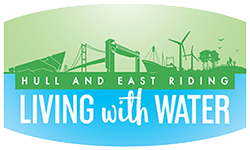About Risky Cities
Background
on the Project
Estuarine and coastal communities are particularly vulnerable in the face of climate change. Communities and businesses in these areas will need to build resilience for an uncertain future by becoming more aware of and adaptive to flood risks.
The city of Hull and Humber estuary region has an 800-year history of living with water risks, including recorded floods from the 1250s onwards and several major floods since 2000. Despite this, research has found that local residents have a low engagement with flood risks and adaptation measures, such as flood alert systems.
In response, the local councils, alongside the Environment Agency, Yorkshire Water and the University of Hull, have developed the Living with Water Partnership with the principle aim of increasing awareness and engagement in the region.
The Risky Cities project contributed to this partnership by drawing on Hull’s long history of living with water – as recorded in its artistic and cultural heritage – to raise climate awareness and build flood resilience today and for the future
Research Themes
This project focussed on three areas of investigation.
Living with uncertain waters
We sought to understand how Hull communities have experienced, responded to and learned to live with water over the last 800 years. We developed understanding on how water has been managed and governed, and about the adaptations and knowledge systems used to develop community resilience.
Fictions of flooding
We explored the fictions of flooding – as recorded in poetry, prose, drama and newspapers – that have arisen alongside, and in response to, the experience of living with water in Hull. These accounts were examined for what they say about how past communities responded to flooding events and whether, by creating artistic recordings of the events, the communities gained resilience.
Learning from the past for an uncertain future
The project team explored the opportunities for using meaningful, place-based stories about the past, as a means of working with present day communities to build climate change awareness and flood resilience. We evaluated the effectiveness of our arts and heritage community interventions and will seek to sought to establish best practice guidelines to be used in future projects in other risky cities.










